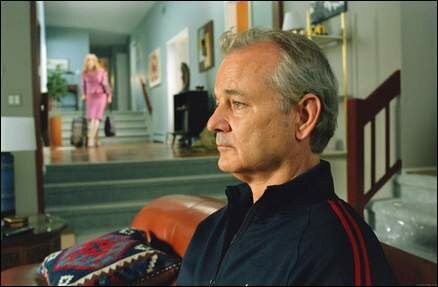
CYRANO'S JOURNAL®
CinemaJim Jarmusch's Broken Flowers is mirror to liberal emptinessBy John Steppling | Dateline: 1 October 2005 |
HOME
http://www.cjonline.org
The same people who think Hal Hartley or Wes Anderson are really cool, are the ones who think Jarmusch has something to say. People will go to "art" houses and watch this stuff, and not the Multi-Plex , and feel satisfied they are serious about culture. It is a vomitorium of liberal emptiness.
ALL RIGHTS RESERVED, 2005 CJONLINE.ORG & SPECIFIC AUTHORS. PLEASE SEE OUR COPYRIGHT NOTICE.
|
Frozen and unexplained mask of perennial angst. Murray's one-note repertory is getting tiresome.
When Jim Jarmusch hit the scene with Down by Law (1986) I remember feeling a bit like the only guy at the dance without a partner. I didn't get it. It all seemed so posed and arch and, finally, cut off from the society around me.
Since then Jarmusch has evolved into the old grey mare of American indi directors. He still makes films that make me feel like I've been left at the altar. I still don't get it.
Broken Flowers is awash in hip-short hand and symbol. Bill Murray is in it (late of Lost in Translation, the most overrated film of the decade, perhaps, and The Great Tannenbaums....another piece of it’s so inside it’s outside hipness). Murray seems close to falling asleep in this one, as if he simply walked off Sophie Coppola's set and onto JJ's. Murray is perfecting blankness, that is perhaps interesting --- in a culture in such abject need of projection. Murray's blankness has allowed him to coast through some films in good check (Groundhog Day for one) but now it’s just a kind of an in-joke that's worn thin.
In this Murray is a successful computer businessman (you don't know if he only marketed or created systems or what...but Jarmusch doesn’t care and feels we shouldn’t either) who is a confirmed bachelor. We take this, then, to be a meditation on loneliness --- which is seen as endemic in womanizing men (I guess)...which is what Murray plays here. The confirmed bachelor motif actually reminds me of I Love Lucy episodes and seems oddly out of sync in our present cultural moment.
Ok, let me try to nail this down a bit more. Murray's womanizing--- though the nature of his appeal is also never addressed or spoken of---is never really explored in the present tense. To do so would violate the hipster code of cool I guess. A computer geek businessman who lives alone a lot and watches TV --- rich and bored and boring. What is appealing about this guy?
Murray's next door neighbor is "ethnic" and working class ----- uh......living next door to a millionaire? Well, ok, Jarmusch is again so hip I guess we better not question such stuff. The amazingly good Jeff Wright plays "Winston" the neo-Ethiopian working class whatever (mechanic? who the fuck knows.....JJ feels we don’t need to know.....but the signifier is there.....Winston wears overalls with his name on the pocket!!). Let me make mention of Wright, though. He might well be America's best actor right now (see him as Martin Luther King in a mediocre TV biopic, or in Shaft). He brings so much life to "Winston" that when he steps out of the film for an hour you suddenly feel your eyelids growing heavy.
The plot is about a search for a lost son --- who Murray didn't know he had. He visits old girlfriends --- a cameo-fest for aging actresses like Jessica Lange, Francis Conroy, and Sharon Stone. The obvious two days’ work (for said actresses) of these episodes make the film painfully predictable. The structure is almost retarded --- ok, let’s say childlike. The ending, as in many JJ films is loose ended and ambiguous. Now, I don't mind poetic and open to interpretation (Beau Travais, or Cruising) --- but in Broken Flowers we just stop --- and at a moment where Jarmusch SHOULD be giving us his deeper take on.....well.....something. If this film is meant to look at the empty hermetic lives of average America; caught in the lifeless and neurasthenic pathologies of consumer culture, then it fails. It fails because one never believes Jarmusch really has spent much time with such people --- and hence all he can do, really, is make fun of them. He might want to step down off the terminal hipster platform and examine himself and his 'so over' lower east side cool pose. If it’s a meditation on middle aged ennui, the confirmed bachelor having to look his bleak future in the eye, it fails as well. It fails because the narrative form is only a scaffolding for a content that remains hidden. We know too little of Murray's past to connect any emotional dots. We see little if anything of how he deals with his wealth, or how he aquired it. We really end up knowing NOTHING about this previous relationships, and at the start when we see Julie Delply walk out on him, we learn NOTHING about that relationship either. Murray's Don Johnston is just a blank slate.
Jarmusch is not an ironist like Bunuel nor he is a satirist, exactly. He hasn’t the sophistication to do either. The same people who think Hal Hartley or Wes Anderson are really cool, are the ones who think Jarmusch has something to say. People will go to "art" houses and watch this stuff, and not the Multi-Plex , and feel satisfied they are serious about culture. It is a vomitorium of liberal emptiness. John Steppling, a playwright and screenwriter, is Cyrano's senior cinema observer.
Care to comment on this review? You can do so in our new CYRANO CINEMA BLOGOSPHERE http://cyranosjournal.blogspot.com/2005/10/cyrano-goes-to-movies.html
|

 Meanwhile, at the burgo critics’ corral—raves! The consistency of class sensibility is simply amazing.
Meanwhile, at the burgo critics’ corral—raves! The consistency of class sensibility is simply amazing.